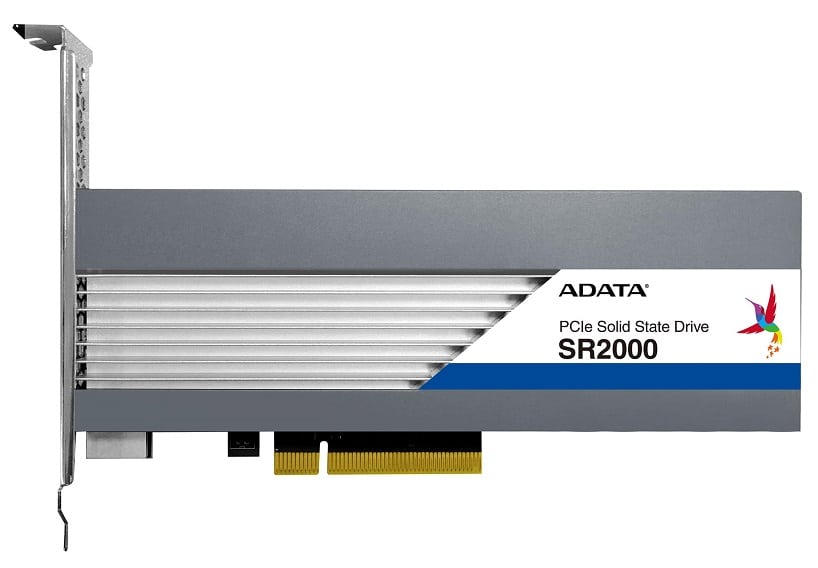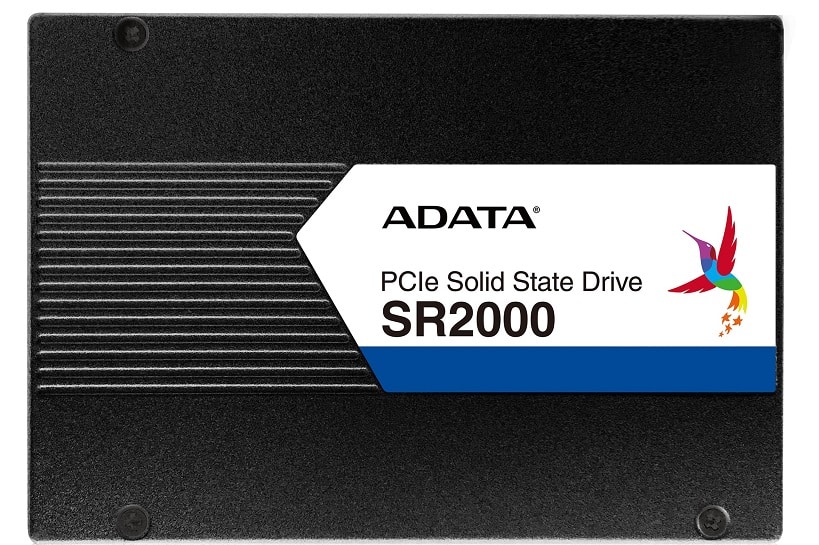
ADATA has propelled itself into the enterprise market with the launch of its new SR2000 SSD series. Featuring two models, the SR2000SP U.2 PCIe and SR2000CP PCIe HHHL AIC, these new enterprise-class drives leverage 3D eTLC NAND Flash technology for a potential transfer rates boost, higher capacities and more endurance. Because ADATA’s new drive seems to use the same controller and NAND as certain Memblaze drives, it looks like another rebrand. Nonetheless, the SR2000 series feature a wide range of capacities from 2TB to 11TB, making them ideal for use cases such as enterprise servers, hyperscale computing, data centers and big data analytics.

The SR2000SP version is expected to hit some pretty good random speeds for a 2.5” drive, quoting up to 830,000 IOPS read and 140,000 IOPS write, while sequential read and write are anticipated to reach upwards of 3,500MB/s. For the SR2000CP, ADATA states sequential read and write speeds of up to an impressive 6,000MB/s and 3,800MB/s, respectively, while random read and write speeds are expected to reach upwards of 1 million and 150,000 IOPS, respectively. Moreover, the new drives feature LDPC ECC technology and DRAM cache buffer.
ADATA has bundled them with TRIM command support and value-added scalable over-provisioning (OP) software, the latter feature which allows users to set OP capacity. The SSDs also support hot swapping to promote minimal downtime of operations as well as various reliability features such as AES 256-bit encryption, data path protection, support for S.M.A.R.T, and shock and vibration resistance.
ADTA SR2000SP Specifications
- Capacity: 2TB / 3.6TB / 4TB / 8TB / 11TB
- Dimensions (L x W x H) : 100.20 x 69.85 x 14.8mm
- Interface: PCIe Gen3x4
- Form Factor: U.2 (2.5")
- Operating Voltage: 12V (±8%)
- Power Consumption: (Idle) 7W, (Operating) 21W
- Shock Resistance: 1500G/0.5ms, Half-Sine Wave
- Operating Humidity 25%-95% RH, non-condensing
- Flash Type: 3D eTLC
- Performance:
- Sequential Read (Max): 3.5GB/s
- Sequential Write (Max): 3.5GB/s
- Random Read (4KB) IOPS: up to 830K
- Random Write (4KB) IOPS: up to 140K
- Operating temperature (Commercial): 0ºC to 35ºC
- Vibration Resistance: 3.13G (5-800Hz)
- Technologies: Scalable OP; Power Failure Protection; Hot plug; AES 256-bit Data Encryption; S.M.A.R.T.; TRIM
ADATA SR2000CP 3D eTLC Specifications
- Capacity: 2TB / 3.6TB / 4TB / 8TB / 11TB
- Dimensions (L x W x H): 167.65 x 56.15 x 18.74mm
- Interface: PCIe Gen3x8
- Form Factor: HHHL AIC
- Operating Voltage: 12V (±8%)
- Power Consumption: (Idle) 8W, (Operating) 21W
- Shock Resistance: 1500G/0.5ms, Half-Sine Wave
- Operating Humidity: 25%-95% RH, non-condensing
- Flash Type: 3D eTLC
- Performance:
- Sequential Read (Max): 6.0GB/s
- Sequential Write (Max): 3.8GB/s
- Random Read (4KB) IOPS: up to 1000K
- Random Write (4KB) IOPS: up to 150K
- Operating temperature (Commercial): 0ºC to 55ºC
- Vibration Resistance: 3.13G (5-800Hz)
- Technologies: Scalable OP; Power Failure Protection; AES 256-bit Data Encryption; S.M.A.R.T.; TRIM
Sign up for the StorageReview newsletter

